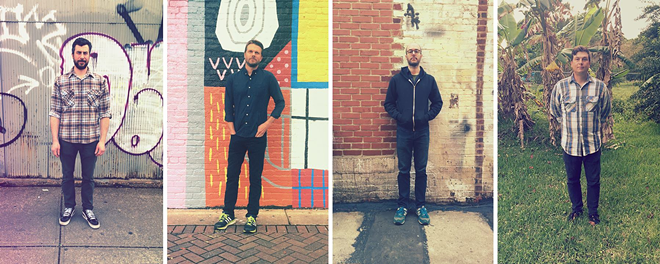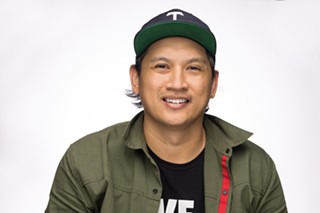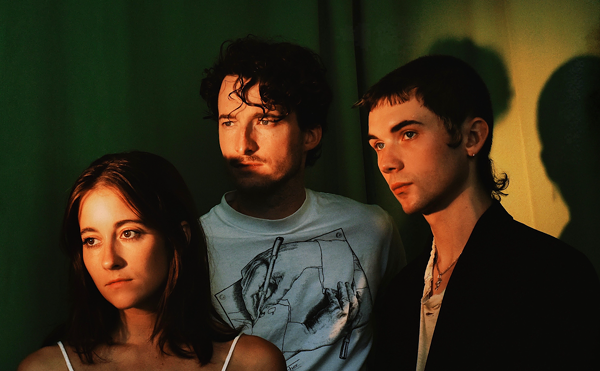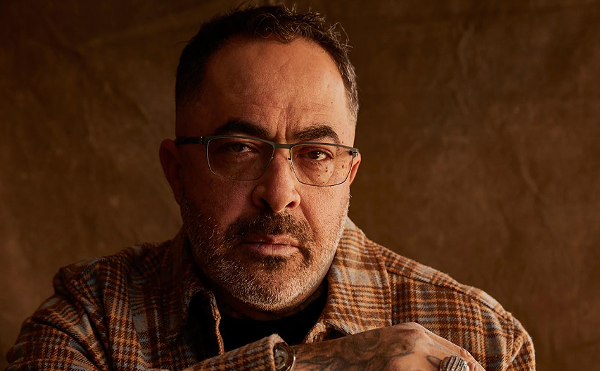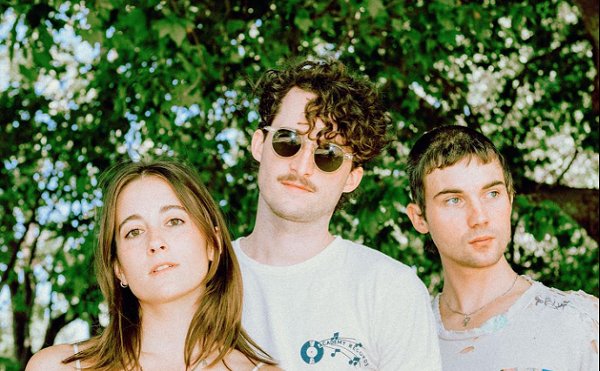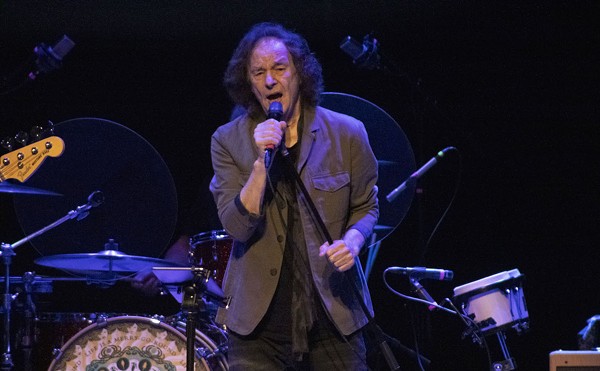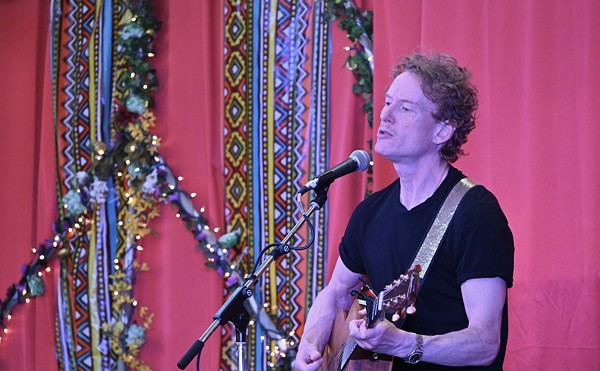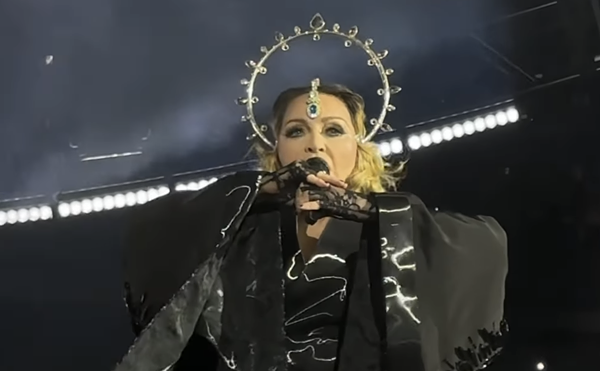The Mercury Program’s 2002 album, A Data Learn the Language, has aged impeccably, and on Thursday the mighty Gainesville instrumental-rock outfit kicks off a tour that celebrates a reissue that finds the effort remastered, repackaged and sounding even better than it did 16 years ago.
Seattle’s Unwed Sailor opens the show, and CL took a good look at the reissue last week, but the full Q&A with Mercury Program guitarist Tom Reno is available below.
The Mercury Program w/Unwed Sailor. Thurs. Nov. 8, 8 p.m. $12-$15. Crowbar, 1812 N. 17th St., Ybor City. aespresents.com.
Do your kids know that there are a bunch of instrumental rock nerds fawning over the re-issue and tour?
I doubt it. I think that a lot of stuff is really unknown to people who know us — our close friends anyhow. Those of us who have kids, the kids know we have a band, but they're largely unaware of anyone caring about it beyond the four adults that they know.
So they don't listen to it?
What's funny is that my kids actually do from time to time, and they can actually pick it out really well. They'll know when a Mercury Program song is on sometimes, which is really cool that they can pick it out from other instrumental music. But we do get stories of people who tell us that they're kids listen to it. There's a guy who's coming to one of the shows from Canada, and his kids listen to it. He sent us some videos of his kids rocking out.
Whit joins the band, and there’s less room for vocals, you don’t have to worry where vocals fit in, and lyrics were always an afterthought anyway.
Yeah.
Data has been called an emotional display of what music can communicate without words. I believe you guys have always just tried to create an atmosphere with your music, but what do you think you were specifically trying to emote or express on Data?
Yeah, well, one thing is that the record came out 16 years ago, and some of the songs are as old as 18 years. So it's can we remember where we were at that time — you'd have to look back and see what sort of things we were into. When I look back, I sort of think of a lot of Warp Records stuff, and Hefty Records, things like that. The Prefuse 73 sounds. It's hard to say if it's anything in particular. All of our tastes are really varied. If you took a poll across the band, there's some common influences that are very minimal, but the rest just scatters around. I would hate to speak for everyone on that.
At the time were just trying to make the most interesting music for us, music that seemed like a step forward in guitar-based, drums and keyboard, right? What else can we do these instruments? Being influenced by a lot of electronic music at the time, that's my memory of where we were.
Interesting to hear you mention Prefuse because when you guys first got together as Yusef’s Well, you would be like, “Let’s make a part that sounds like Hoover,” or “Let’s make it so this part sounds like the Crownhate Ruin.”
Right, yeah. Funny, that far back for sure.
So yea, those were your Confusion Records in Stuart with John — do you remember if you did any of that kind of emulating, maybe with Warp Records sounds, when you wrote Data?
No, I don't think so. It's been a long time since we felt like we were trying to emulate anything. Those were just pieces of things that start to influence you as you are listening to them. You hear particular sounds, and a lot of that stuff is largely based on instrumental stuff. Prefuse has vocal samples, but it's not vocal-based music, right?
Yup.
So if anything, it was just this idea that electronic music at the time had moved into being much more melodic and a lot less purely rhythmic. Even then, there were certain acts that were sampling Rhodes or vibes parts, so we heard those similar sounds, which we were into. But collectively it's really hard to say. Dave, who is the drummer was much more into electronic and contemporary classical artists like Steve Reich. That was really Dave's influence on the collective of us. So it's really hard to say.
I feel like the record before that, which would've been All the Suits Began To Fall Off, that was really the first one where we felt like the writing process was unrelated to any influences. We were just making music. That was where we found us, as far as my personal opinion of the band. Other members might feel different, but to me that was the first one that was the Mercury Program sound, solid. And then Data was just the next progression on that — there was no talk like, "Hey this sounds a little bit like 'X' band."
When you're young, especially in early bands, that's the common language you have; it's some other band to reference and then eventually you play together long enough and you stop referencing other music. You reference the particular sound, or a particular, like you said, a particular atmosphere, that you are after. And that's when, I think, our own thing — as much as I see it — came about.
And to follow up on some things you said, is the set up for the tour like it's been in the past? How many vibes? Rhodes, bongos... I’m assuming the laptop for the electronic elements. Anything different?
Nothing really major. Years ago we used to bring lightning with us. Fluorescent lights that we would set on the floors, but we do have a more proper lighting set up this time. There's some Eurorack modular things that Dave's bringing for some of the intros and outros of things. There'll be a little more live manipulation of electronics. I don't think anything has a laptop. It's actually done on a piece of equipment. So chaos pads, other little triggers, lots of other little things, but those are really just to try and contribute to the transitional parts or the background atmospheres of things that go on. The core instruments are there; Rhodes, vibes, guitar-based drums.
You mentioned Suits. Just to be clear — is there a legit intermission between the Chez Viking/New Myths set and the Data set? Also, will you touch All the Suits Began to Fall Off, Confines of Heat and From the Vapor of Gasoline?
So we actually are going back as Suits on this. We've got a couple songs from Suits. We've got stuff from Confines, stuff from Chez, stuff from New Myth. That might be as far back as we go. I don't think there's anything on the Vapor of Gasoline record that we've played since we toured for that record in 2000. We really stopped playing that almost as quickly as we wrote it. It was very short lived.
We'll do one set that's basically all of that other stuff. We'll probably take 10 minutes just because playing two 50-minute sets back-to-back is a long time. Intermission, and then we'll do Data start to finish.
Where’s your mind been going as these rhythms from Data come back into your life?
It's funny to reconnect with stuff that's that old, right? I don't know how often people do that — small bands that revisit something that old. Certainly, if you're Radiohead you can never escape material that's that age, but reconnecting with some of these songs that were written 18 years ago is kind of fun. It's interesting for all of us because we don't write music or even play music the same way 18 years later, so some of it is almost retraining yourself.
At first it feels like you're learning a cover song because you think, "Why would I have played it like this?" But yeah, it's fun. It's still really enjoyable music to me. From a very personal standpoint, I feel like it's aged very well. It doesn't feel like I'm playing very outdated music, so that feels good. To have produced some sort of music that feels like it's maintained its — "relevance" is a heavy word — but it hasn't really quickly become like, "Oh, this sounds like 1992 emo," you know what I mean? I feel like we totally hit the jackpot on that just by chance, and managed to make a record that still feels OK this many years later.
You mentioned wondering why you'd play certain parts a certain way. It’s been 16 years since Data dropped. On it, people were freaking out about the tone that you and Whit were able to get out of your gear. What knowledge, technically were you bringing to that record, and what have you learned since then that may have an effect on the way the record will sound at these shows?
I think we've all just gotten better as musicians, so being able to perform those things live, I think we'll do a much better job of than we did 16 years ago. It's just different. You just grow a lot, so what seemed complicated to you that long ago seems fairly easy to do just as you've gotten more technical as a musician and honed your skill. So some of the songs, I look back and think, "Man this song used to be challenging to play," and now I am playing through it thinking, "This is super easy."
So that part makes the performance a little more enjoyable since you're not having to be so hyper-present on everything.
And to move to the reissue in case we run out of time. Are you able to shed a little more light on what happened with Counterflow Records’ legal/financial troubles and the missing lot of Data vinyl? I think fewer than 100 copies made it onto circulation — it's mythical.
I'm OK on time. We really have no idea if anything they told us was real.
OK.
What we were told was that there was 1,000 of them pressed, and that some of them had a drop-in 7-inch in them. So that was just a random thing. This varies, and I know at times I've said 250 I knew existed, I don't know that that's true. I remember that the band specifically got 100. I do remember at least one shipment of 100 copies of that record. We may have gotten more later, but I only remember ever laying hands on 100 of them. That's all I can verify that ever existed.
So you've never seen the package with a 7-inch dropped in?
Yeah, and if you open the original there's a flap. And it says something in the flap about the drop-in 7-inch, but no one has ever seen it. No one has ever laid eyes on it, and Counterlflow folded really shortly after, and when we tried to contact everyone that we knew that was associated with them we got radio silence. Our assumption was that, wherever they had these warehoused, whenever they went bankrupt somebody just went it and went, "Clear all this shit out, throw it in the dumpster." So we have no clue. That's where I've ended the story when I've been asked recently. I know of 100 because we actually physically had them. Beyond that I can't say for sure.
There were some that were sold, we saw some online at a few places, and I think even InSound, back in the day, had some that they got from Counterflow. So I feel like there was another smaller batch out. That's why it was so crazy expensive on Discogs. The prices are ridiculous for that record.
Kind of awesome in a way.
It's kind of flattering to think, "Wow, we've made a record that people are willing to pay over $200 for," but it also seems silly. I'm glad that the reissue is out there and that people can enjoy the record without having to spend that. It certainly takes away from some of the cult status and the mystique of having this really rare record, but that first pressing is still that rare, and if you have it, then great.
And, in your opinion, what was Bob Weston able to do with the record at Chicago Mastering Service? Does it sound much different to you?
The first one, they didn't actually sequence the tracks correctly. When they mastered the first one, any song that had a bleed in between it, they left the two-second gap that was present on the audio file, so it would stop. They didn't sequence it right, and it was never actually mastered for vinyl. They just took the digital version and pressed it to LP. That record was done in an interesting way in that the drums and bass all went to tape, but the tape was all loaded into Pro Tools later. So we got hitting tape, and that sound, but then it went to Pro Tools. Then, when we were done, we mixed it down, out of Pro Tools.
In 2002, putting things on vinyl wasn't all that important. Staying analog had not become this thing. It was like, "Whatever, mix it out of Pro Tools and master it, then send it directly to the CD plant."So when we had Bob go back, we didn't have anything except the original digital Pro Tools stuff, so that's what he remastered it for vinyl from. I think it sounds the best that the record has ever sounded. One, it's not on a digital format, and Bob also has a really good ear for taking out things that shouldn't be there that you're not gonna hear anyway. Things that are just cluttering things up frequency-wise. I've only heard test pressings at this point, and they sound great.
I'm assuming you also got some mulligans on the design and packaging.
I changed some things back. So Counterflow did the original setup because they wanted their designer to be involved in setting up all the artwork. I can't remember the reason for that back then, so I helped guide them from a distance and was never super-thrilled with how it came out.
The labels are new. It's a gatefold now, and it was never a gatefold before. The type layout has changed a little bit. There are just little things that got put back to the way that I had kind of wanted them to be originally, but with Counterflow it became to much of an issue and I just gave in. I think the design is in a better space now.
Are you guys are still a tri-city band? Before New Myths you hadn’t been together for four years and got snowed-in in Vermont to record — what was practice and prep like for this tour?
We are, it's interesting. For a long time Dave and Sander were both in New York City, and about a year-and-half-ago Dave moved back to Gainesville. We are still three-city, but now it's two in Gainesville and one in New York City. We still, really largely, rehearse independently. They get here four days before the first show, so we'll have four days of practice where we'll all be in the same town. The third city now is Minneapolis because Whitney is there, so it's New York, Minneapolis, Gainesville.
I’m assuming it’s just logistics, but can you talk about why you’re kicking the tour off in Ybor City, just blocks away from New World Brewery where you’ve had memorable gigs?
Yeah, I am so bummed that we can't do it at New World, actually.
I know.
We love that space. Honestly, it's partially because Jack [Spatafora, promoter and production coordinator at CL] is amazing and we love him to death. We sort of feel like we want to give him first dibs on whatever night works for him.
OK.
So when I started booking it we contacted Jack first and tried to work around what worked for him, working backwards knowing that the only date we really wanted to have set was the Saturday in Gainesville. I went to college in Tampa, spent a lot of time there. I love Tampa. It's one of the first places, whenever we tour, we always try to get a Tampa show. Starting it there seems great.
It's different to hear a band approach it that way. That loyalty. Tampa, you know?
Well, and you know Jack. He's loyal as well. We sort of come from that time when that was important and valued and it wasn't just about how much money somebody can squeeze out of something. He has taken care of us, I can't even remember not playing a show with him. All those shows at Orpheum, New World Brewery. I don't think we've played one down there — other than maybe 403 Chaos in, like, 1998 — that wasn't with Jack.
Oh my gosh. That is bringing it all the way back.
That may have been the oldest thing we ever did there, and that wouldn't have been him. Otherwise they have all been his shows.
So bringing it all the way back. Data is a record that changed a lot of people’s musical lives and listening habits — how’ve you been reacting to the fans’ reactions to the re-issue and tour. At this point you kind of have two generations of fans…
It's funny. That's been a surprise to us. Even when we've played, and it's been probably two years. It's a surprise to us that there are fans who are new. We just sort of assumed that it would be a lot of our old friend and people who knew of us before, but then you show up and there's somebody who is 22, and you're like, "Wow, you were five years old when this record came out, or six years old." It's amazing. It's not lost on us how special that is and how fortunate we are to be in a situation where that's happening. It's probably something that is easily taken for granted, but we try not to do at all.
The touring behind your early records put a strain on relationships between guys in the band — how are those relationships now that we’re all older?
I think we've been really fortunate to remain really close friends. Two of the members, obviously, are actual brothers, but I think the rest of us are family to each other, and so the relationship strains, I don't know that there were anything more than…
Just being on the road.
Yeah, and, you know, you start making music between 16 and 20. You have to have life transitions. People need to do other things, and move to different cities and follow relationships wherever they needed to go. I don't think there was any bad blood for us or any relationship strain that was more than just needing a break from touring together.
We've always been very democratic about everyone's time and contribution to the band. So if someone is not able to contribute or devote their time, then the band just waits. It's always been just the four of us. There's never been this thing where it's like, "We gotta keep going, so let's get a fill-in."
Yeah, it's amazing that you were smart enough to realize that you were getting burned out on the road. A lot of bands can never recognize that, and it ends badly. The band went on that extended hiatus, two of them actually, because you didn’t have a record, didn’t want to tour and wanted to work at your own pace. Has the run up to this reissue and tour re-ignited any kind of desire to kick things back up in a major way or is everyone just too busy?
I can only speak for the pattern that has repeated itself a couple times now, and that is, generally, once we start getting back together and active, playing music together with everyone enjoying that we tend to immediately start planning the next time we can get back together. Obviously family obligations can slow that up, and life obligations make it complicated. Distance, all of those things. The glacial pace that we work at isn't always intentional. The set of circumstances that our lives are in, we try to be accommodating to everyone's needs, and when it all lines up, then we do it. I think if we do anything next, then it would be to try and get to the West coast, maybe to Japan and finish out doing as much justice to this reissue as we can. Give that all the energy that we have.
After that, what we do next still sort of remains to be seen, but I hope that we can put some time back into trying to make a record that is as well-received and impactful as Data was for some people. It's a hard feat to top or even repeat.
Definitely, and Pitchfork is still around to nitpick on everything.
Yeah, well you know.
They were kind to your records.
They were. To get anything over a seven with them — especially in those years — they were generous and kind. They could have really decided that they were gonna destroy something, and they didn't.
So weird. Yet we always read the review. It's the review you love to hate.
I do the same thing, too. It's part of my morning routine, nearly daily.
I was gonna ask you Holopaw questions, but that's really all I have. Did you wanna add anything or get off your chest. There hasn't been a ton of press in between the last album and the reissue.
We're super grateful. Being back in Tampa, playing Crowbar and getting to play this record for a lot of people who we know have been fans, friends, some people down there are like family for us. To get back there, and to start there, is really important and meaningful, so we are super excited to be back. Tampa has changed, and Ybor has changed, so much in the amount of time that we've been going there, but we are thrilled to be back and to still be able to do a show there that people care about. That we can show up all these years and have people still be into it. It's shocking to us still.
Even though you go online, people are freaking out and they are saying nice stuff. You look at it and think, "Is this real?" It seems so strange that people still care all these years later. We're extremely grateful that that still occurs.

